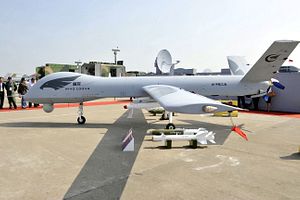On February 25, reports surfaced citing sources within Indonesia’s military as confirming that the Southeast Asian state had agreed to acquire four drones from China. Though the reports are merely a reiteration of what Indonesian defense officials had said last year, they nonetheless reinforce Jakarta’s efforts to boost its capabilities in this respect and the inroads that Chinese drones are making in some key markets.
As I have been noting in these pages, Indonesian defense officials have been signaling the need to boost the country’s drone capabilities, recognizing that the country does not have nearly enough vessels and aircraft to fully monitor its vast airspace and coastline. So it is no surprise that we have seen Jakarta aim to make purchases in this regard from countries such as the United States (See: “New Indonesia Drones Spotlight US-ASEAN Maritime Security Initiative”).
Indonesia has also been looking at China as an option as well. Though Chinese drones are certainly far less capable than those manufactured by more established players such as the United States or Israel, they are also significantly cheaper which is a draw for more budget-conscious countries like Indonesia. Beijing, for its part, has also been stepping up its showcasing of its capabilities, including its family of Wing Loong UAVs for export, with a debut appearance at the Singapore Airshow this year indicating its desire to target key Asian markets.
Last July, Laksda Leonardi, the head of Indonesia’s defense ministry’s Defense Facilities Agency, said that China had offered to meet Jakarta’s requirement for the Indonesian Air Force to acquire UAVs. Though few concrete additional details were provided at time or subsequently, Leonardi’s comments, which also touched on the greater difficulty of acquiring some of these capabilities from more established manufacturers, it was indicative of Indonesia’s willingness to consider a wide range of players for its defense needs.
On February 25, in further evidence of what had previously been reported, IHS Jane’s cited multiple sources within Indonesia’s military as confirming that the government had indeed acquired four strike-capable Wing Loong I medium-altitude, long-endurance UAVs from Chinese state-owned aerospace and defense company Aviation Industry Corporation of China back in 2017.
According to these sources, the UAVs would be operated by the Indonesian Air Force’s Aviation Squadron 51 in West Kalimantan which currently operates Israeli-made Aerostar tactical unmanned aircraft system. As IHS Jane’s noted, with the introduction of the Wing Loong I, it would be Indonesia’s first composite UAV squadron with two different aircraft types. That is testament to both Jakarta’s willingness to turn to multiple manufacturers to realize its urgent requirements and the inroads that Chinese defense products could make in key Asian markets like Indonesia where factors such as cost and speed of delivery, rather that robustness of capability or experience of manufacturing, may matter more.

































